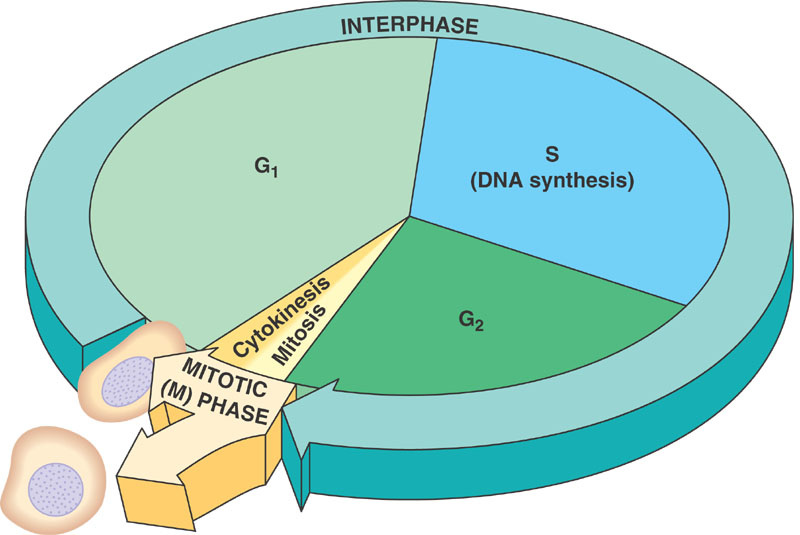PPT Unit 7 Cell Division Genetics and Molecular Biology Biology Diagrams Cell cycle is the name we give the process through which cells replicate and make two new cells. Cell cycle has different stages called G1, S, G2, and M. G1 is the stage where the cell is preparing to divide. To do this, it then moves into the S phase where the cell copies all the DNA. So, S stands for DNA synthesis. After the DNA is copied and there's a complete extra set of all the genetic The cell cycle is a cycle of stages that cells pass through to allow them to divide and produce new cells. It is sometimes referred to as the "cell division cycle" for that reason. It occupies around 95% time of the overall cycle. The interphase is divided into three phases:- G1 phase (Gap 1) - G1 phase is the phase of the cell between mitosis and initiation of replication of the genetic material of the cell. During this phase, the cell is metabolically active and continues to grow without replicating its DNA.

The most basic function of the cell cycle is to duplicate accurately the vast amount of DNA in the chromosomes and then segregate the copies precisely into two genetically identical daughter cells. These processes define the two major phases of the cell cycle. DNA duplication occurs during S phase (S for synthesis), which requires 10-12 hours and occupies about half of the cell-cycle time in

Cell Cycle - Definition, Phases, Examples, Regulation Biology Diagrams
The study of the cell cycle focuses on mechanisms that regulate the timing and frequency of DNA duplication and cell division. As a biological concept, the cell cycle is defined as the period

The cell cycle Figure 1. Hand drawn images of dividing cells. From Zellsubstanz, Kern und Zelltheilung, by Walther Fleming, 1882. If living cells are observed under the microscope, they visibly change in morphology (size and shape) as they prepare for and then undergo cell division. One of the first biologists to observe this was Walther Fleming, who developed methods for staining cells that Actively dividing eukaryote cells pass through a series of stages known collectively as the cell cycle: two gap phases (G1 and G2); an S (for synthesis) phase, in which the genetic material is duplicated; and an M phase, in which mitosis partitions the genetic material and the cell divides. G1 phase. Metabolic changes prepare the cell for division. At a certain point - the restriction point Explore how the cell cycle control system regulates cell division through key phases, proteins, and checkpoints to maintain genomic stability and prevent errors.
